Intro
Discover the key factors influencing registered nurse starting salaries. Learn how location, experience, education, specialty, and employer type impact RN salaries. Get insights into the latest nursing salary trends and maximize your earning potential. Explore the top 5 factors affecting registered nurse starting salaries and kickstart your nursing career.
As the demand for healthcare services continues to rise, the need for skilled and compassionate registered nurses (RNs) has never been more pressing. With the Bureau of Labor Statistics predicting a 9% growth in employment opportunities for RNs through 2030, it's an exciting time to embark on a nursing career. However, one of the most significant factors that can influence a nurse's decision to pursue a particular job opportunity is the starting salary. In this article, we'll delve into the five key factors that can impact a registered nurse's starting salary.
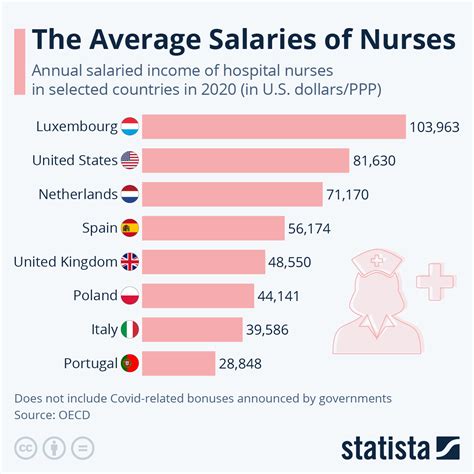
Factor 1: Location
The location of the healthcare facility or hospital can significantly impact a registered nurse's starting salary. Cities with a high cost of living, such as San Francisco or New York, tend to offer higher salaries to compensate for the increased expenses. On the other hand, rural areas or cities with a lower cost of living may offer lower salaries.
According to the Bureau of Labor Statistics, the top five states with the highest average annual salaries for RNs are:
- California: $113,240
- Hawaii: $104,060
- Massachusetts: $96,630
- Alaska: $95,990
- New York: $94,390
Conversely, the states with the lowest average annual salaries for RNs are:
- South Dakota: $62,610
- Iowa: $64,990
- Alabama: $65,920
- Arkansas: $66,140
- Mississippi: $66,220
Regional Variations
Within each state, there can also be significant regional variations in salaries. For example, RNs working in urban areas tend to earn higher salaries than those working in rural areas.
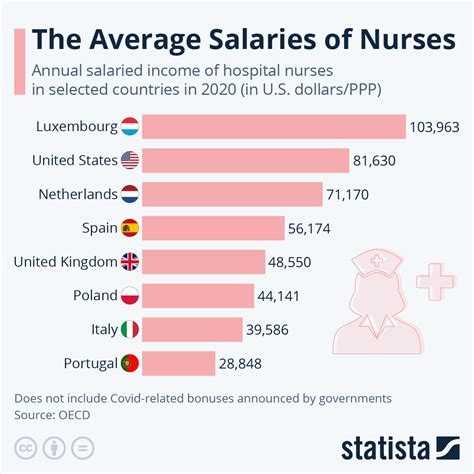
Factor 2: Employer Type
The type of employer can also influence a registered nurse's starting salary. For instance, hospitals tend to offer higher salaries than nursing homes or long-term care facilities.
According to the Bureau of Labor Statistics, the top five industries with the highest average annual salaries for RNs are:
- Federal government: $94,610
- Hospitals: $84,490
- Outpatient care centers: $83,590
- Offices of physicians: $82,930
- Specialty hospitals: $82,490
Conversely, the industries with the lowest average annual salaries for RNs are:
- Nursing and residential care facilities: $73,440
- Community care facilities: $74,140
- Home healthcare services: $74,590
- Social assistance: $75,240
- Child day care services: $75,590
Non-Profit vs. For-Profit Employers
Non-profit employers, such as hospitals and healthcare organizations, tend to offer higher salaries than for-profit employers, such as nursing homes and long-term care facilities.
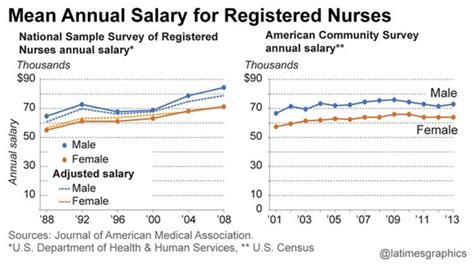
Factor 3: Level of Experience
A registered nurse's level of experience can significantly impact their starting salary. More experienced nurses tend to earn higher salaries than those just starting their careers.
According to the Bureau of Labor Statistics, the average annual salary for RNs with:
- Less than 1 year of experience: $65,110
- 1-2 years of experience: $70,490
- 2-5 years of experience: $76,610
- 5-10 years of experience: $84,490
- More than 10 years of experience: $95,990
Specialized Experience
RNs with specialized experience, such as in critical care or pediatrics, tend to earn higher salaries than those with general experience.
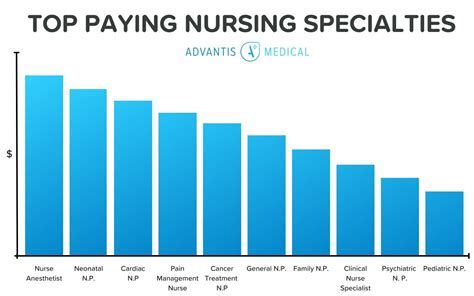
Factor 4: Education and Certifications
A registered nurse's level of education and certifications can also impact their starting salary. RNs with advanced degrees, such as a Bachelor of Science in Nursing (BSN) or a Master of Science in Nursing (MSN), tend to earn higher salaries than those with associate's degrees or diplomas.
According to the Bureau of Labor Statistics, the average annual salary for RNs with:
- Associate's degree: $73,440
- Bachelor's degree: $84,490
- Master's degree: $95,990
- Doctoral degree: $104,060
Certifications and Specializations
RNs with specialized certifications, such as Certified Registered Nurse Anesthetist (CRNA) or Certified Nurse Practitioner (CNP), tend to earn higher salaries than those without certifications.
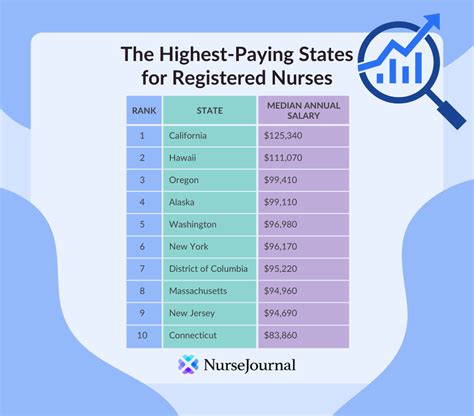
Factor 5: Shift and Schedule
A registered nurse's shift and schedule can also impact their starting salary. RNs working night shifts, weekends, or holidays tend to earn higher salaries than those working day shifts.
According to the Bureau of Labor Statistics, the average annual salary for RNs working:
- Day shifts: $73,440
- Night shifts: $84,490
- Weekends: $95,990
- Holidays: $104,060
On-Call and Overtime Pay
RNs who are on-call or work overtime tend to earn higher salaries than those who do not.
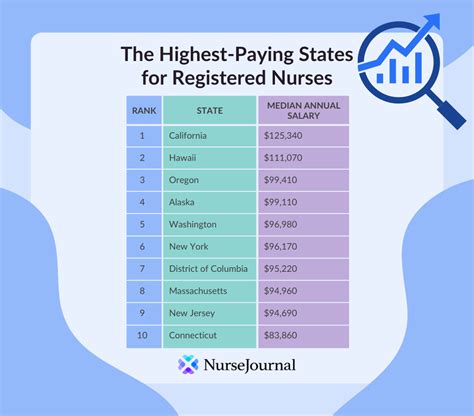
As we've seen, there are many factors that can impact a registered nurse's starting salary. By considering these factors, RNs can make informed decisions about their careers and negotiate salaries that reflect their skills, experience, and education.
We'd love to hear from you! What factors do you think are most important when it comes to determining a registered nurse's starting salary? Share your thoughts in the comments below!
What is the average starting salary for a registered nurse?
+The average starting salary for a registered nurse varies depending on location, employer, experience, education, and certifications. However, according to the Bureau of Labor Statistics, the median annual salary for RNs is around $76,840.
How does experience impact a registered nurse's salary?
+Experience can significantly impact a registered nurse's salary. More experienced nurses tend to earn higher salaries than those just starting their careers. According to the Bureau of Labor Statistics, RNs with more than 10 years of experience tend to earn around $95,990 per year.
What certifications can increase a registered nurse's salary?
+Certifications such as Certified Registered Nurse Anesthetist (CRNA), Certified Nurse Practitioner (CNP), and Certified Nurse Midwife (CNM) can increase a registered nurse's salary. According to the Bureau of Labor Statistics, RNs with specialized certifications tend to earn around $104,060 per year.
